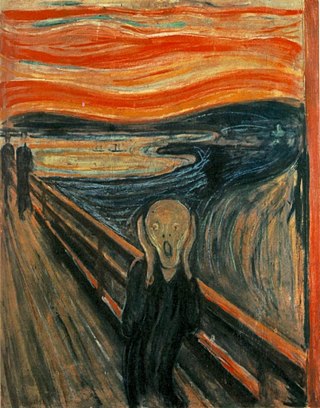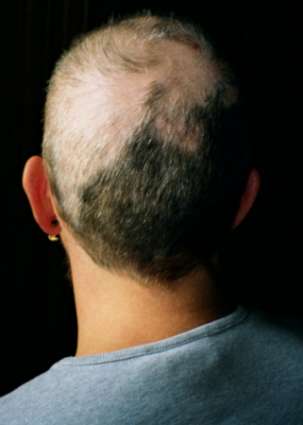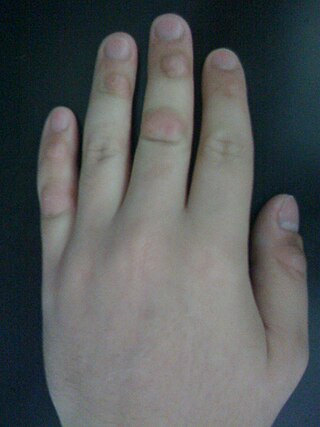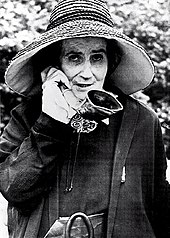A mental disorder, also referred to as a mental illness or psychiatric disorder, is a behavioral or mental pattern that causes significant distress or impairment of personal functioning. A mental disorder is also characterized by a clinically significant disturbance in an individual's cognition, emotional regulation, or behavior. It is usually associated with distress or impairment in important areas of functioning. There are many different types of mental disorders. Mental disorders may also be referred to as mental health conditions. Such features may be persistent, relapsing and remitting, or occur as single episodes. Many disorders have been described, with signs and symptoms that vary widely between specific disorders. Such disorders may be diagnosed by a mental health professional, usually a clinical psychologist or psychiatrist.

Anxiety disorders are a cluster of mental disorders characterized by significant and uncontrollable feelings of anxiety and fear such that a person's social, occupational, and personal functions are significantly impaired. Anxiety may cause physical and cognitive symptoms, such as restlessness, irritability, easy fatigue, difficulty concentrating, increased heart rate, chest pain, abdominal pain, and a variety of other symptoms that may vary based on the individual.

Trichotillomania (TTM), also known as hair-pulling disorder or compulsive hair pulling, is a mental disorder characterized by a long-term urge that results in the pulling out of one's own hair. A brief positive feeling may occur as hair is removed. Efforts to stop pulling hair typically fail. Hair removal may occur anywhere; however, the head and around the eyes are most common. The hair pulling is to such a degree that it results in distress and hair loss can be seen.

Hypochondriasis or hypochondria is a condition in which a person is excessively and unduly worried about having a serious illness. Hypochondria is an old concept whose meaning has repeatedly changed over its lifespan. It has been claimed that this debilitating condition results from an inaccurate perception of the condition of body or mind despite the absence of an actual medical diagnosis. An individual with hypochondriasis is known as a hypochondriac. Hypochondriacs become unduly alarmed about any physical or psychological symptoms they detect, no matter how minor the symptom may be, and are convinced that they have, or are about to be diagnosed with, a serious illness.

Obsessive–compulsive personality disorder (OCPD) is a cluster C personality disorder marked by a spectrum of obsessions with rules, lists, schedules, and order, among other things. Symptoms are usually present by the time a person reaches adulthood, and are visible in a variety of situations. The cause of OCPD is thought to involve a combination of genetic and environmental factors, namely problems with attachment.

Hoarding disorder (HD) or Plyushkin's disorder, is a mental disorder characterised by persistent difficulty in parting with possessions and engaging in excessive acquisition of items that are not needed or for which no space is available. This results in severely cluttered living spaces, distress, and impairment in personal, family, social, educational, occupational, or other important areas of functioning. Excessive acquisition is characterized by repetitive urges or behaviours related to amassing or buying property. Difficulty discarding possessions is characterized by a perceived need to save items and distress associated with discarding them. Accumulation of possessions results in living spaces becoming cluttered to the point that their use or safety is compromised. It is recognised by the eleventh revision of the International Classification of Diseases (ICD-11) and the Diagnostic and Statistical Manual of Mental Disorders, 5th edition (DSM-5).
Abnormality is a behavioral characteristic assigned to those with conditions that are regarded as rare or dysfunctional. Behavior is considered to be abnormal when it is atypical or out of the ordinary, consists of undesirable behavior, and results in impairment in the individual's functioning. Abnormality in behavior, is that in which is considered deviant from specific societal, cultural and ethical expectations. These expectations are broadly dependent on age, gender, traditional and societal categorizations. The definition of abnormal behavior is an often debated issue in abnormal psychology, because of these subjective variables.
Normality is a behavior that can be normal for an individual when it is consistent with the most common behavior for that person. Normal is also used to describe individual behavior that conforms to the most common behavior in society. However, normal behavior is often only recognized in contrast to abnormality. In many cases normality is used to make moral judgements, such that normality is seen as good while abnormality is seen as bad, or conversely normality can seen as boring and uninteresting. Someone being seen as normal or not normal can have social ramifications, such as being included, excluded or stigmatized by wider society.

Self-destructive behavior is any behavior that is harmful or potentially harmful towards the person who engages in the behavior.
Emotional and behavioral disorders refer to a disability classification used in educational settings that allows educational institutions to provide special education and related services to students who have displayed poor social and/or academic progress.
The obsessive–compulsive spectrum is a model of medical classification where various psychiatric, neurological and/or medical conditions are described as existing on a spectrum of conditions related to obsessive–compulsive disorder (OCD). "The disorders are thought to lie on a spectrum from impulsive to compulsive where impulsivity is said to persist due to deficits in the ability to inhibit repetitive behavior with known negative consequences, while compulsivity persists as a consequence of deficits in recognizing completion of tasks." OCD is a mental disorder characterized by obsessions and/or compulsions. An obsession is defined as "a recurring thought, image, or urge that the individual cannot control". Compulsion can be described as a "ritualistic behavior that the person feels compelled to perform". The model suggests that many conditions overlap with OCD in symptomatic profile, demographics, family history, neurobiology, comorbidity, clinical course and response to various pharmacotherapies. Conditions described as being on the spectrum are sometimes referred to as obsessive–compulsive spectrum disorders.
Sexual obsessions are persistent and unrelenting thoughts about sexual activity. In the context of obsessive-compulsive disorder (OCD), these are extremely common, and can become extremely debilitating, making the person ashamed of the symptoms and reluctant to seek help. A preoccupation with sexual matters, however, does not only occur as a symptom of OCD, they may be enjoyable in other contexts.

Compulsive behavior is defined as performing an action persistently and repetitively. Compulsive behaviors could be an attempt to make obsessions go away. Compulsive behaviors are a need to reduce apprehension caused by internal feelings a person wants to abstain from or control. A major cause of compulsive behavior is said to be obsessive–compulsive disorder (OCD). "The main idea of compulsive behavior is that the likely excessive activity is not connected to the purpose to which it appears directed." There are many different types of compulsive behaviors including shopping, hoarding, eating, gambling, trichotillomania and picking skin, itching, checking, counting, washing, sex, and more. Also, there are cultural examples of compulsive behavior.
Compulsive buying disorder (CBD) is characterized by an obsession with shopping and buying behavior that causes adverse consequences. It "is experienced as a recurring, compelling and irresistible–uncontrollable urge, in acquiring goods that lack practical utility and very low cost resulting in excessive, expensive and time-consuming retail activity [that is] typically prompted by negative affectivity" and results in "gross social, personal and/or financial difficulties". Most people with CBD meet the criteria for a personality disorder. Compulsive buying can also be found among people with Parkinson's disease or frontotemporal dementia.

Obsessive–compulsive disorder (OCD) is a mental and behavioral disorder in which an individual has intrusive thoughts and feels the need to perform certain routines (compulsions) repeatedly to relieve the distress caused by the obsession, to the extent where it impairs general function.
Personality disorders (PD) are a class of mental disorders characterized by enduring maladaptive patterns of behavior, cognition, and inner experience, exhibited across many contexts and deviating from those accepted by the individual's culture. These patterns develop early, are inflexible, and are associated with significant distress or disability. The definitions vary by source and remain a matter of controversy. Official criteria for diagnosing personality disorders are listed in the sixth chapter of the International Classification of Diseases (ICD) and in the American Psychiatric Association's Diagnostic and Statistical Manual of Mental Disorders (DSM).

Body-focused repetitive behavior (BFRB) is an umbrella name for impulse control behaviors involving compulsively damaging one's physical appearance or causing physical injury.
Hoarding: Buried Alive is an American documentary television series that premiered on TLC on March 14, 2010. The show follows hoarders through their life experiences and helps them learn to manage their illness.
Just Checking by Emily Colas is an account of her experience with obsessive-compulsive disorder. Divided into four sections, Colas provides snapshots of her life in a journal like manner. The text conveys her emotions regarding the disease throughout her entire life including her childhood and her role as a mother herself.
Money disorders refer to problematic financial beliefs and behaviors that can cause significant distress and hinder one's social or occupational well-being. These issues often stem from financial stress or an inability to effectively utilize one's financial resources, leading to clinically significant challenges. Money disorders refer to enduring and often unchanging patterns of self-destructive financial behaviors that lead to considerable stress, anxiety, emotional anguish, and significant disruptions in various areas of a person's life.











